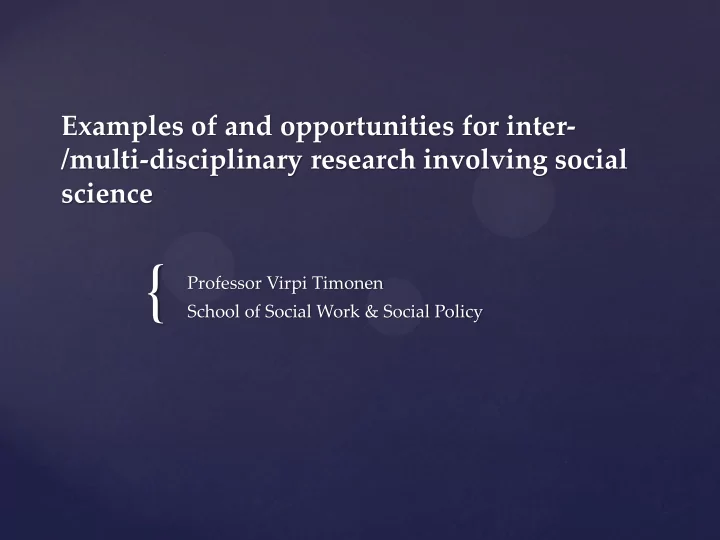

Examples of and opportunities for inter- /multi-disciplinary research involving social science { Professor Virpi Timonen School of Social Work & Social Policy
If you are interested in complex human behaviours , outcomes, experiences & perceptions – shared interest in PATTERNS How (sub-groups of) people experience/perceive/are affected by – and in turn shape - health/environment/health services Especially if these have not been previously studied OR if there are good grounds for arguing that existing instruments are not valid / reliable for the purposes of capturing and understanding the behaviour / experience Conducive towards re-orientation of services and supports around the needs and aspirations of the individual, transcending professional/disciplinary boundaries Requirement/recommendation in many research funding schemes… Why social science?
The life course approach with focus on children and outcomes over time; inter-generational families; inequality, and developmental outcomes Policy-focused research on social issues such as homelessness, child protection, crime Large selection of other areas of interest – see e.g. https://www.tcd.ie/research/themes/inclusive- society/ Strands within TCD
Quantitative social science: focus on generalising, testing theories - need random, representative samples, large N Qualitative social science: The focus is on generating concepts, hypotheses & theory - from the specific towards the general – strong on tracing processes, hard-to-reach populations, sensitive topics Strengths of qualitative and quantitative social science
Quantitative data: surveys; (administrative) records Qualitative data: Observation; in-depth (semi- structured or unstructured) interviews; focus group (interviews); case studies Context is important – tell about it, don’t disguise it – try to understand how it matters Good at tapping into sources of variance in outcomes – whether macro or micro Social science instruments
Depression by grandchild care, education and social and leisure activity Primary/none Secondary Third/higher 30 20 10 0 No child <60 60+ No child <60 60+ No child care No child <60 60+ No child care <60 60+ <60 4 2 3 4 care care care No active and social leisure Active and social leisure Adjusted for age, age 2 , sex, education, income (quintiles), employment, disability
I thought at this stage in my life that it would be time for me to do things that I want to do and it hasn’t worked out that way because they way life has gone, I mean I am very tied with grandchildren and children and everything else and while it is nice and I love to have them but we don’t seem to have time anymore… there are an awful lot of grandparents now looking after children and who are tied.
married single (never married) separated widowed male female 80 60 40 20 0 50-64 65-74 >=75 50-64 65-74 >=75 Distribution of marital status by sex and gender among the 50+ population, Ireland, 2011
I’m very glad I never married , yes, because I think I’ve had a chance to do much more than I would have when I see my sister who is the classic married lady, she’s still running home to get [husband’s dinner] at half past five and if she’s not there, there’ll be uproar and I really would never have coped with that... ... my money I can fiddle around and nobody telling me I can’t buy new curtains...so the independence is just wonderful, I’d hate to sell it, I mean it is priceless, in fact I can’t see any advantage to being married . I regret it anyway, I wouldn’t recommend anyone staying on their own....because it is lonely, just to have somebody with you, you know, somebody to go places or whatever...what I would love to do is go for a weekend away, to know somebody to go for a weekend away or for a week’s holiday...I wouldn’t go on my own...I’d like to meet somebody, have a little bit of life at the end of my life.
All Cause Mortality: Ireland and OECD
The Healthy Life Expectancy Gap 85 80 75 10 Years 70 Age 16 Years 65 Life Expectancy Disability Free Life Expectancy 60 55 50 Least 2 3 4 Most deprived deprived Level of Deprivation
The Increasing Risk of Chronic Ill Health with Childhood Adversity 3.5 Depression 3 Risk Relative to No ACE Frailty 2.5 Heart 2 1.5 1 One ACE Two ACEs Three ACEs McCrory et al 2014 “The Ghost of Childhood Past: The Lasting Legacy of Childhood Adversity for Disease Risk in Later Life” Health Psychology.
Prospective study of risk factors in early life: Early life exposures, health status and educational development Differential mortality by SES Group ‘Social mobility’ and markers of ageing Early life disease and differential ageing ‘Social and economic exposures’ and biological processes The Life Course Determinants of Health Inequalities (Richard Layte and colleagues)
www.infantandchildresearchlab.com
Research to explore the factors that inhibit and enable age appropriate communication between parents and young children aged between 4 and 9 years about relationships, sexuality and growing up. Team: Catherine Conlon & Virpi Timonen, SWSP, TCD. ‘Research with Parents’
How people with amyotrophic lateral sclerosis (ALS) engage with healthcare services (G. Foley et al.) To identify key psycho-social processes that underpin ALS service user engagement with healthcare services In other words….. Why do people with ALS use healthcare services? What conditions impact on how they engage? What shapes how they make decisions about care?
Primary categories & core category
Conclusions Losing control and fighting to remain in control – shape the clinical encounter HCPs are primary enablers for control among people with ALS People with ALS are adverse to sustaining life for sake of longevity alone Disease progression is not primary context to how people with ALS engage with HCPs Family (in particular parenthood) is primary context Trinity College Dublin, The University of Dublin
In order to understand the complexity of health/health care, we need to combine different approaches to ‘knowing what is going on here’ Be clear what you need the social sciences input for Play to the strengths of social sciences – keeping in mind the different methodological approaches and what they offer Get in touch! Conclusions
Recommend
More recommend